- Battery Manufacturing Equipment
- Battery Laboratory Assembly Equipment
- Battery Pack Assembly Equipment
- Sodium Ion Battery Manufacturing Equipment
- Solid State Cell Production Line
- Dry Electrode Assembly Equipment
- Supercapacitor Assembly Equipment
- Perovskite Solar Cell Lab Equipment
- Li ion Battery Materials
- Ni / Al / Cu Metal Foam
- Customized Electrode
- Cathode Active Materials
- Anode Active Materials
- Coin Cell Parts
- Lithium Chip
- Cylindrical Cell Parts
- Battery Current Collectors
- Battery Conductive Materials
- Electrolyte
- Battery Binder
- Separator and Tape
- Aluminum Laminate Film
- Nickel Strip/Foil
- Battery Tabs
- Graphene Materials
- Cu / Al / Ni / Stainless steel Foil
- Battery Laboratory Equipment
- Li ion Battery Tester
- Battery Safety Tester
- Material Characterization Tester
- Rolling Press Machine
- Electrode Mixer
- Coin Cell Crimping Machine
- Coin Cell Electrode Disc Punching
- Pouch Cell Sealing Machine
- Pouch Cell Stacking Machine
- Pouch Cell Forming Machine
- Pouch Cell Ultrasonic Welder
- Pouch Cell Electrode Die Cutter
- Cylinder Cell Sealing Machine
- Cylinder Cell Grooving Machine
- Electrode Slitting Machine
- Cylinder Cell Winding Machine
- Cylinder Cell Spot Welding Machine
- Electrolyte Filling
- Type Test Cell
- Other Battery Making Machine
- NMP Solvent Treatment System
- Vacuum Glove Box
- Coating Machine
- Lab Furnaces
- Ball Mill
- Laboratory Press
- Laboratory Equipment
- Press Equipment
- 2023-06-21
A pouch cell Pilot line is a manufacturing setup specifically designed for the production of pouch cells, which are a type of lithium-ion battery. Pouch cells have gained popularity due to their compact size, high energy density, and flexibility in design. The fabrication line consists of various processes and equipment required for the assembly and manufacturing of pouch cells. Let's explore the key components and stages involved in a typical pouch cell fabrication line:
Electrode Preparation:
Coating: This process involves coating a thin layer of active material slurry onto a current collector film, typically made of copper or aluminum.
Drying: The coated electrodes are passed through drying ovens or chambers to remove solvent and ensure proper adhesion of the active material.
Electrode Stacking:
Electrode Calendaring machine: The coated electrodes are calendared to improve their density and adhesion. This process involves passing the electrodes through a pair of rollers under controlled pressure.
Stacking: The calendared electrodes are then stacked together, alternating between the positive and negative electrodes. Separators, which act as insulating layers, are placed between the electrode layers.
Electrolyte Filling:
Electrolyte filling machine: The electrolyte, typically a lithium-ion conducting liquid, is prepared according to specific formulations and quality standards.
Vacuum Filling: The stacked electrode layers are vacuum-sealed, and the electrolyte is injected into the pouch cell to fill the space between the electrodes.
Sealing:
Heat Sealing: The filled pouch cells are heat-sealed to ensure a complete enclosure and prevent electrolyte leakage. This process involves applying heat and pressure to the pouch cell edges to create a hermetic seal.
Formation and Aging:
Battery Formation machine: The sealed pouch cells undergo a formation process where they are subjected to controlled charging and discharging cycles. This process helps stabilize the cell's performance and capacity.
Aging: The aged cells are further tested and monitored to ensure their safety, performance, and reliability before they are deemed ready for use or distribution.
Quality Control and Testing:
Various quality control tests are conducted throughout the fabrication line to ensure the consistency and reliability of the pouch cells. These tests include electrode thickness measurement, electrolyte filling volume verification, cell voltage testing, capacity testing, and other performance evaluations.
Packaging and Final Assembly:
The fabricated pouch cells are packaged and assembled into battery packs or modules according to specific requirements. This may involve additional protective casing, thermal management components, and electronics for monitoring and control.
Pouch cell fabrication lines find extensive applications in various industries and sectors. Here are some practical applications and uses of pouch cells:
Electric Vehicles (EVs): Pouch cells are commonly used in the automotive industry for electric vehicle batteries. They offer high energy density, lightweight design, and flexibility in shape and size, making them suitable for integration into the limited space of electric vehicles. Pouch cell fabrication lines play a crucial role in producing the battery packs that power electric cars, providing the necessary energy storage for long-range driving.
Portable Electronics: Pouch cells are widely used in portable electronic devices such as smartphones, tablets, laptops, smartwatches, and wireless earbuds. Their slim and compact form factor, combined with high energy density, allows for longer device runtimes and improved portability. Pouch cell fabrication lines are responsible for manufacturing the batteries that power these everyday gadgets.
Energy Storage Systems: Pouch cells are utilized in energy storage systems, including residential and commercial energy storage solutions. These systems store excess energy generated from renewable sources such as solar panels and wind turbines and release it when needed. Pouch cell fabrication lines enable the production of high-capacity batteries for efficient energy storage and management.
Consumer Electronics: Pouch cells are found in a wide range of consumer electronics, including digital cameras, portable gaming devices, cordless power tools, and electric toothbrushes. Their small size, lightweight, and reliable performance make them a popular choice for these applications. Pouch cell fabrication lines ensure the mass production of batteries that meet the demand for consumer electronics.
Medical Devices: Pouch cells are used in various medical devices and equipment, such as implantable medical devices, wearable health trackers, and portable medical diagnostic devices. Their stable performance, high energy density, and long cycle life make them suitable for critical medical applications. Pouch cell fabrication lines play a crucial role in producing batteries that meet the stringent safety and reliability requirements of the medical industry.
Aerospace and Defense: Pouch cells find applications in aerospace and defense sectors, powering unmanned aerial vehicles (UAVs), satellites, communication systems, and military equipment. Their lightweight design and high energy density are advantageous for aerospace applications where weight and space constraints are critical. Pouch cell fabrication lines contribute to the production of batteries that meet the demanding requirements of these industries.
Grid Energy Storage: Pouch cells are employed in large-scale grid energy storage systems, which store electricity from renewable sources or during off-peak hours and release it during high-demand periods. These systems help stabilize the electrical grid, improve energy efficiency, and support renewable energy integration. Pouch cell fabrication lines enable the production of batteries for grid-scale energy storage projects.
The widespread adoption of pouch cells in these applications demonstrates their versatility, reliability, and performance. Pouch cell fabrication lines play a vital role in meeting the demand for high-quality batteries in various industries, driving innovation, and enabling the transition to a more sustainable and electrified future.
-
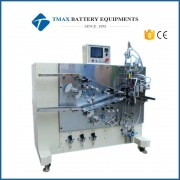 Automatic Cylinderical Battery Electrode Winding Machine
Read More
Automatic Cylinderical Battery Electrode Winding Machine
Read More
-
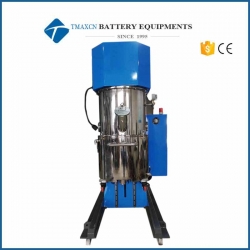 100-200L Double Planetary Vacuum Mixing Machine for Lithium Battery Slurry
Read More
100-200L Double Planetary Vacuum Mixing Machine for Lithium Battery Slurry
Read More
-
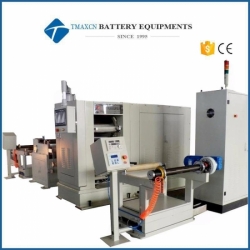 Large Heating Roller Press Machine Calender For Li ion Battery Production Line
Read More
Large Heating Roller Press Machine Calender For Li ion Battery Production Line
Read More
-
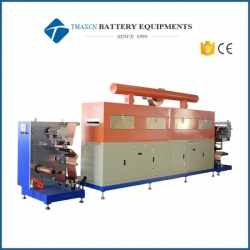 Large 3 Rollers Battery Electrode Film Intermittent Coating Machine for Pilot Production Line
Read More
Large 3 Rollers Battery Electrode Film Intermittent Coating Machine for Pilot Production Line
Read More
-
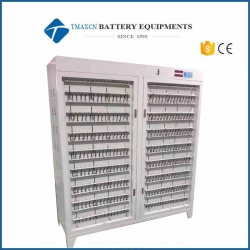 512 Channel 5V3A Battery Grading Machine/Battery Charge Discharge Machine Tester
Read More
512 Channel 5V3A Battery Grading Machine/Battery Charge Discharge Machine Tester
Read More
 English▼
English▼




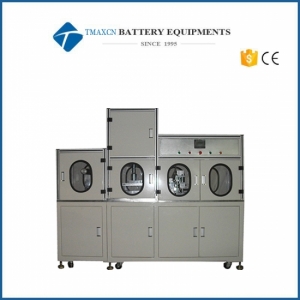
 David@battery-equipments.com
David@battery-equipments.com

